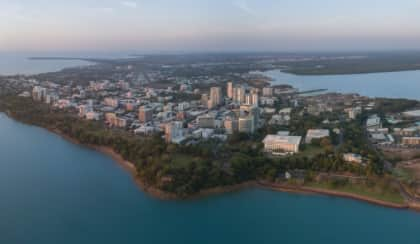Economic growth drives Darwin’s commercial property market boom

According to the latest LJ Hooker Commercial Market Monitor, Darwin’s commercial property market is thriving, supported by the NT’s gross state product growing at nearly three times the national average, marking a 4.6 per cent expanded economy in 2023–24.
The report highlighted that strategic infrastructure projects have reinforced Darwin’s position as a major logistics and trade hub.
Prime industrial rents in the NT rose $160–$180 per square metre, up from $130–$150 per square metre a year earlier, while secondary rents lifted around 10 per cent to $100–$120 per square metre.
In-demand industrial land in areas like Darwin’s Berrimah is selling for $230–$270 per square meter, attracting significant interest from developers.
Director of LJ Hooker Commercial North NT, Lee Doyle, said there is a strong demand for premium industrial assets, mainly driven by logistics operators and defence contractors.
“The e-commerce boom and the push for greater supply chain security are further increasing demand for warehouse and storage facilities,” he said.
“With strong rental yields and limited supply, Darwin’s industrial market continues to present excellent opportunities for investors.”
In the office sector, the report indicated that Darwin recorded the second-lowest A-grade vacancy rate nationally at 5.3 per cent, well below its 10-year average of 10.5 per cent.
It also revealed that A-grade office rents have reached $750 per square metre, driven largely by government tenants, while B-grade rents have climbed to $450 per square metre on the back of spillover demand.
LJ Hooker Commercial director for North NT, Ryan Doyle, said there was growing interest in Darwin’s strata office market from private investors and self-managed super funds seeking to expand their portfolios.
“Compared to interstate markets, where strata office yields typically sit between 5 and 7 per cent, Darwin presents a compelling opportunity with higher returns and replacement cost upside,” he said.
“The combination of strong yields and relative affordability makes these assets particularly appealing, especially when compared to the residential market, where yields often fall below 5 per cent.”
Data showed that the trend of shifting towards higher-quality properties is prompting owners of lower-grade office spaces to reassess their investment strategies and upgrade or reposition their assets.
With C-grade vacancy rates sitting at 50 per cent, landlords are upgrading assets to B-grade standards or converting them into student accommodation.
However, proposed changes to student visa rules could create uncertainty ahead of the 2025 federal election.
Meanwhile, Darwin’s retail sector remains stable despite broader economic challenges.
Suburban shopping centres and strip retail locations continue to attract tenants, with healthcare and service-based retailers increasingly replacing traditional fashion and food outlets.
Strip retail rents sit between $300 and $400 per square metre, while shopping centres are commanding more than $1,000 per square metre, underpinned by government and service-sector tenants.
